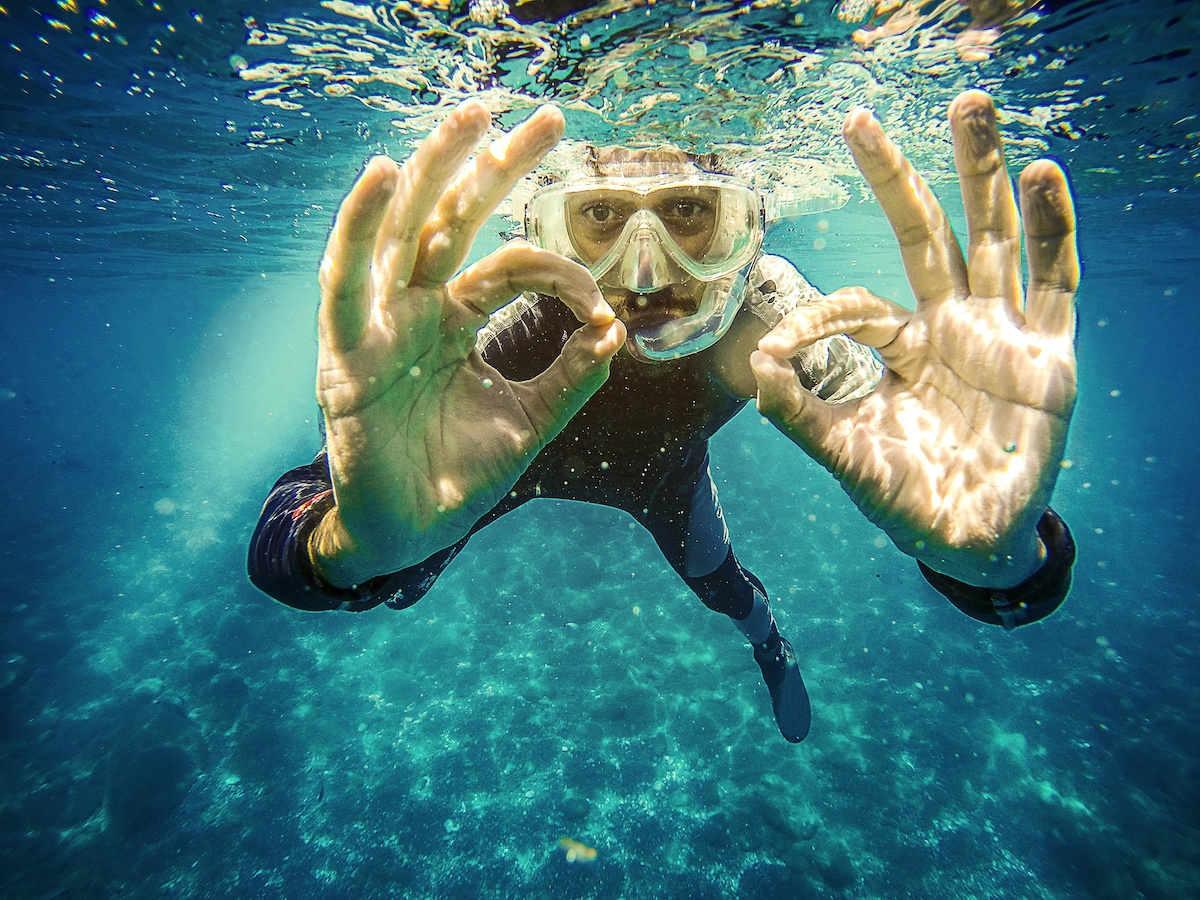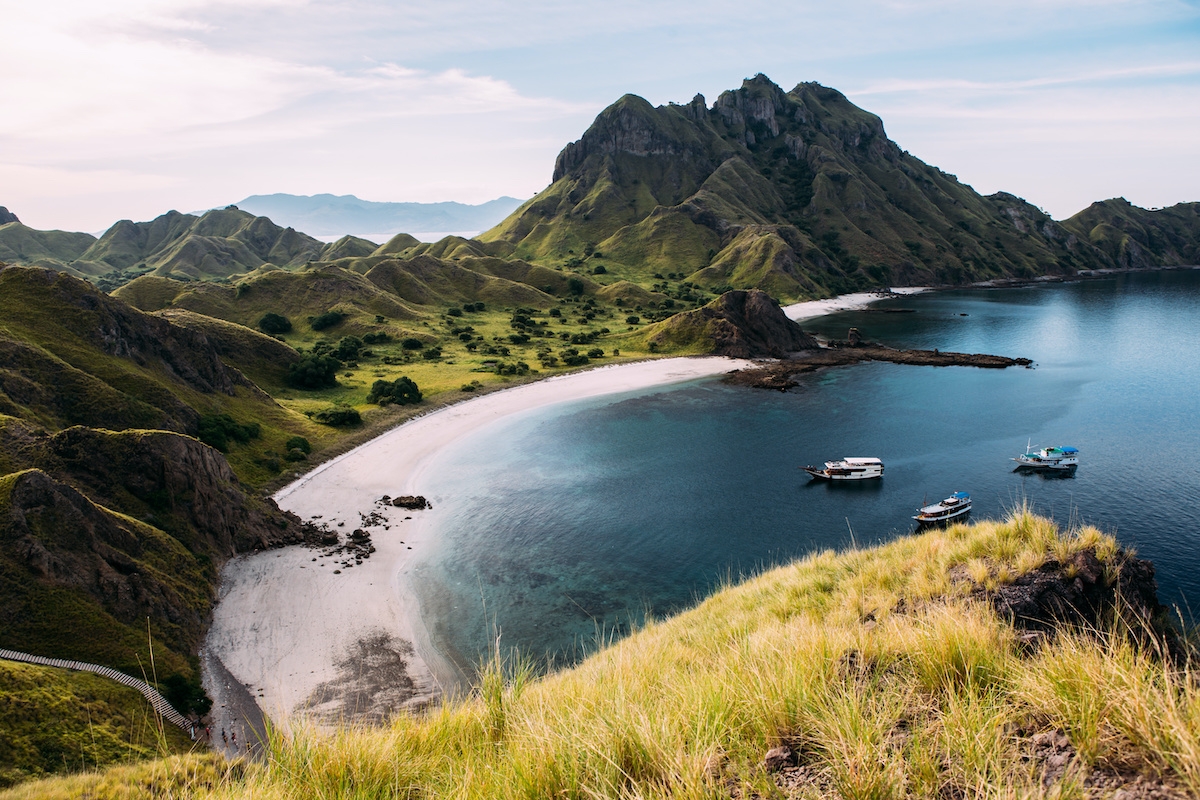
© Scuba diver underwater showing ok signal with two hands.

© Landscape view from the top of Padar island in Komodo islands, Flores, Indonesia.

© This equipment you need for a liveaboard trip
Liveaboard Diving Holiday - 10 best tips to make it a success
October 31, 2019
Whether you’re new to liveaboard diving or a seasoned cruiser, the last thing you want is a packing disaster when you’re far out to sea. Our simple tips and tricks will help your liveaboard trip run smoothly, so you can forget trying to swim ashore for a new mask and focus on the incredible marine life instead.
The 10 best tips for a successfully liveaboard holiday
1. Swap hard cases for soft luggage bags
Space can be tight in liveaboard cabins (and onboard) for storing large suitcases and bags, so it’s best to pack using soft or foldable luggage bags you can stow away easily.
2. Check and service your dive gear before leaving home
Check all of your dive gear is fully functional before leaving home and consider having it serviced by a professional before your trip. There is nothing worse than arriving on your liveaboard to discover there’s a rip in your BCD or a split mouthpiece on your regulator. Whilst rental equipment and spares are usually available onboard in case something breaks, it’s always better using your own gear. If you have space and luggage allowance to spare, take a spare mask, fin straps and mouthpiece with you as well.
3. Bring spare rechargeable batteries for cameras
As you’re usually diving 3 to 4 times per day on a liveaboard, there is little time between dives to fully charge your batteries. It’s best to have at least one extra set to charge whilst you’re using the other one. That’s especially true for cameras that are known to have a short battery life.
4. Add essentials for easy days of diving and excellent sleeping
There are a few simple additions to your luggage that can make your days and nights much more comfortable onboard. If you’re prone to sea sickness, take non-drowsy medication with you to make sure you’re not too unwell or tired to participate in diving. With so many motion sickness medications available, it’s a good idea to test yours before your trip to make sure it doesn’t have side effects. Boats are constantly in motion at sea and, whilst accommodation is very comfortable onboard, the noises of boat life can disturb sleep. If you’re a light sleeper, take some ear plugs with you and always pack a spare set. Being small, they are easy to lose. If you’re going somewhere hot and sunny, remember to pack a good reef-safe sunscreen so you don’t get burnt during surface intervals and are not polluting the ocean. Non-chemical sunscreens with zinc oxide as the main ingredient are generally the best reef-safe options.
5. Take multiple sets of swimwear
Most boats have a ‘dry’ area, meaning you’ll likely need to change into dry clothes between dives to rest, eat and drink. To avoid getting changed back into cold, wet swimwear for your next dive, take spare sets on your trip. By taking multiple sets of swimwear you can always dive in dry swimwear whilst your spare sets are drying. If your swimwear doesn’t have straps to secure it whilst drying on deck, take a shoelace or similar to tie your swimwear to a chair or rail and prevent it blowing away.
6. Pack lightly
Dress codes onboard are usually very casual, so there’s no need to pack your best evening wear. You’re more likely to wear loose, comfortable clothes most of the time, so focus on taking quick drying options that work for you. It’s also a good idea to take a warm layer for evenings, as you can get cold after multiple dives. As most boats have a ‘no shoe’ rule, you also don’t need to take much footwear. If your trip includes land excursions, such as hiking during
Komodo diving safaris, pack a good pair of shoes.
7. Layer up to keep warm underwater
Depending on the destination, it’s a good idea to dive using flexible layering options such as full length wetsuits, shorty wetsuits, thermal vests and hoods. You’re likely to get cooler as your dive week progresses and you’ve done multiple dives. By layering up, you can add or remove thermal protection as needed.
8. Choose the right air conditioning settings to prevent congestion
Whilst air conditioning can be a welcome retreat from hot environments, be aware that sleeping with air conditioning can cause congestion. Using the ‘dry’ setting on most modern AC units set at 20 – 22 °C (i.e. not freezing cold) minimises the changes of getting congested and not being able to equalise during your dives. If possible, avoid using air conditioning completely.
9. Look after your ears
Constant diving in tropical waters can create a breeding ground for bacteria in your ears. If you’re prone to ear infections or want to prevent them, consider taking an ear neutralising solution with you. Some boats may even provide a vinegar/water solution that offers similar results.
10. Take a few biodegradable trash bags with you
Take some biodegradable trash bags with you, in case your gear isn’t fully dry after your trip. You can place wetsuits, boots etc in these bags to avoid soaking the rest of your luggage and clothing.

[caption id="attachment_5957" align="aligncenter" width="1200"]

Landscape view from the top of Padar island in Komodo islands, Flores, Indonesia.[/caption]

This article was written by divers and writers at
LiveAboard.com
 [caption id="attachment_5957" align="aligncenter" width="1200"]
[caption id="attachment_5957" align="aligncenter" width="1200"] Landscape view from the top of Padar island in Komodo islands, Flores, Indonesia.[/caption]
Landscape view from the top of Padar island in Komodo islands, Flores, Indonesia.[/caption]
 This article was written by divers and writers at LiveAboard.com
This article was written by divers and writers at LiveAboard.com 

